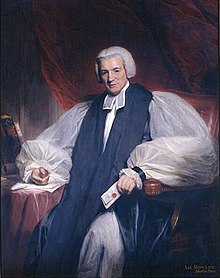William Howley
|
The Most Reverend and Right Honourable William Howley |
|
|---|---|
| Archbishop of Canterbury | |
 |
|
| Province | Canterbury |
| Diocese | Canterbury |
| See | Canterbury |
| Installed | 1828 |
| Term ended | 1848 |
| Predecessor | Charles Manners-Sutton |
| Successor | John Bird Sumner |
| Personal details | |
| Born | 12 February 1766 Ropley, Hampshire, England |
| Died | 11 February 1848 Lambeth, Surrey, England |
| Buried | St Mary the Blessed Virgin Church, Addington, London |
William Howley (1766–1848) was a clergyman in the Church of England. He served as Archbishop of Canterbury from 1828 to 1848.
Howley was born in 1766 at Ropley, Hampshire, where his father was vicar. He was educated at Winchester College and in 1783 went to New College, Oxford. He became Chaplain to the Marquess of Abercorn in 1792, whose influence was critical in advancing his early career. In 1809 he was appointed Regius Professor of Divinity at Oxford University (as well as previously becoming a Fellow of Winchester and a Canon of Christ Church, Oxford in 1804.)
He was an active English Freemason, having joined the 'Royal York Lodge' in Bristol on 21 December 1791, aged 25, and served the lodge regularly until his elevation to the episcopate took him to London.
In October 1813, at Lambeth Palace, he was consecrated Bishop of London, a post he was to occupy until 1828, when he became Archbishop of Canterbury.
Howley was Archbishop during the repeal of the Test and Corporation Acts (1828), the Emancipation of the Catholics (1829) and the passing of the Great Reform Act (1832). The bench of bishops was generally opposed to all three measures. As archbishop, Howley was their spokesman, and his heart-felt opposition to the Great Reform Act led to his carriage being attacked in the streets of Canterbury.
Like very many other bishops at that time, Howley was an "old-High Churchman." These inherited a tradition of high views of the sacraments from the Caroline Divines and their successors. They held Catholic beliefs but were consistently anti-Roman. They were often despised by the more extreme Tractarians and their beliefs were often obscured, for example, in Richard William Church's classic account of the Oxford Movement.
...
Wikipedia
